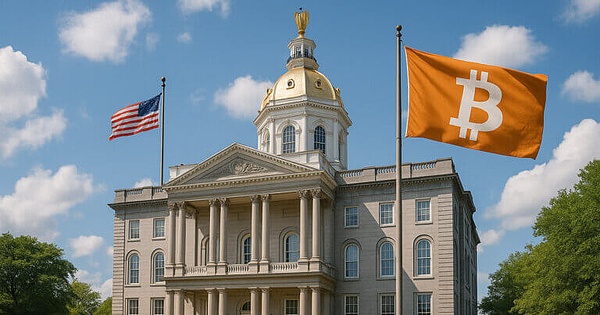New Hampshire has enacted the nation’s first state-level strategic BTC reserve law, establishing a framework for allocating a portion of state funds to BTC and a select number of digital assets.
On May 6, Governor Kelly Ayotte signed House Bill 302 (HB 302), authorizing the state’s treasurer to hold BTC in a regulated reserve structure. The model policy, developed by the nonprofit Satoshi Action Fund, aims to formally establish BTC as a state government financial reserve asset.
The bill, introduced by Rep. Keith Ammon (R-Hillsborough 40th District), was originally introduced in 2022 and passed with the help of Majority Leader Jason Osborne, the New Hampshire Blockchain Commission, and other local supporters.
The law allows the Secretary of the Treasury to purchase BTC and other digital assets with a market value of more than $500 billion. Currently, only BTC meets this standard.
The holding limit is 5% of the state reserve portfolio, and it must be guaranteed by a U.S.-regulated custody arrangement.
Ayotte confirmed the signing of the bill on social media, saying: "New Hampshire is leading the country again! A new law has just been signed that allows our state to invest in Crypto assets and precious metals."
New Hampshire House Republicans also echoed the governor's remarks, posting that the "Unfree or Dead" state is leading the future direction of business and digital assets.

These assets will be held by state-controlled multi-signature schemes, qualified custodians, or exchange-traded products in the United States to ensure compliance and transparency. The regulation will take effect 60 days after the date of promulgation.
Dennis Porter, CEO of the Satoshi Action Fund, also issued a statement saying that House Bill No. 302 is a blueprint for national adoption.
Growing Movement
With the approval of the bill, New Hampshire becomes the first U.S. state to enact legislation to establish a strategic BTC reserve.
According to Bitcoin Laws, 37 of the 50 U.S. states have proposed similar legislation, but most have failed to pass so far. The remaining 13 states have not yet submitted legislative proposals for state-level BTC reserves.
The Satoshi Action Fund has drafted more than 20 similar bills across the country and has been advocating for the establishment of BTC-based reserves to diversify fiscal strategies.
The organization reports having helped pass six pro-BTC state-level laws to date and claims to have facilitated over 220,000 voter letters in support of such initiatives across the country.
House Bill 302 makes New Hampshire a test case for broader state-level BTC adoption.
Strategic BTC Reserve Race
According to BTC Law’s “State Reserve Race” tracker, Arizona is the most likely state to become the second state to enact a strategic BTC reserve bill.
On May 1, the Senate Majority recommended agreeing to the House's amendment to Arizona Senate Bill 1373 (SB 1373). The Senate will now send the bill to the House for consideration, after which it may be sent to the Governor for signature.
North Carolina and Texas followed closely behind, and their Crypto asset reserve proposals are currently being submitted to the Senate committee for secondary consideration.
By establishing a legal reserve policy and setting operational parameters, New Hampshire has pioneered an enforceable framework for holding BTC in public fiscal accounts in the United States.
 Miyuki
Miyuki







